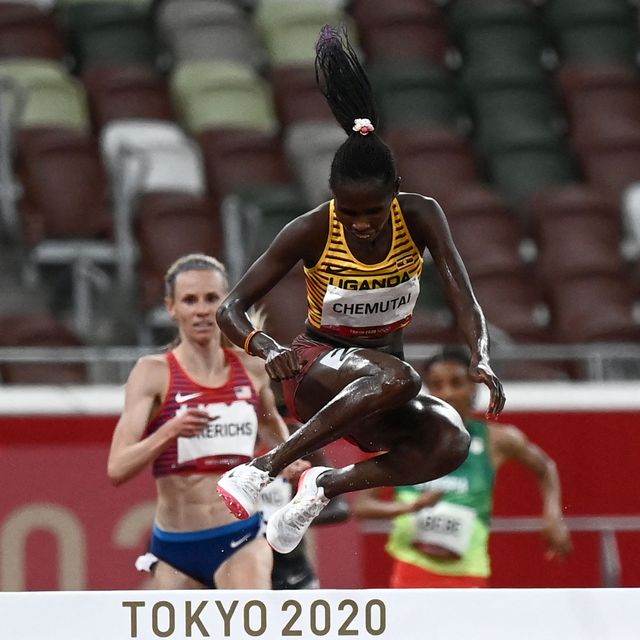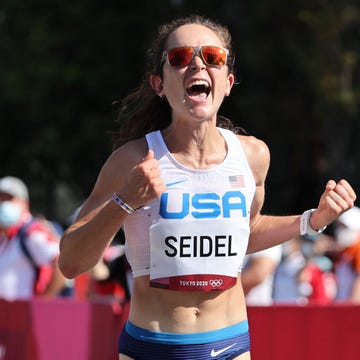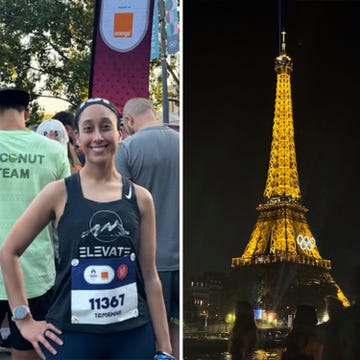After passing American Courtney Frerichs on the backstretch of the last lap, Peruth Chemutai of Uganda won the women’s 3,000-meter steeplechase in 9:01.45 on August 4 in Tokyo, a national record. Chemutai’s medal is the first Olympic medal of any sort in any sport for a Ugandan woman.
Frerichs, the American record-holder, held her form nicely after losing the lead and finished second in 9:04.79. Hyvin Kiyeng of Kenya, the 2016 silver medalist, won the bronze medal in 9:05.39. Frerichs’s silver is the best Olympic performance by an American woman in this event.
→ Join Runner’s World+ to stay up to date on the Tokyo Olympics!
Olympian Molly Seidel Is Taking the Slow Road Back. Emma Coburn , the U.S. champion and 2016 bronze medalist, struggled once Frerichs pushed the pace. She tripped on a hurdle in the last lap, and was initially listed as finishing 14th in 9:41.50. She was later disqualified for stepping on or inside the rail lining the track.
“This is an absolute dream come true,” Frerichs said. “I grew up doing gymnastics as a kid and always watching the Olympic Games, hoping one day that I would be there. Now to have a medal, it’s just more than I can ask for.”
After a slow opening, Frerichs took the lead with four laps to go. Within a lap, what had been a tightly bunched pack was spread out, with only five women in Frerich’s slipstream. Reaching 2,000 meters in 6:05.17, Frerichs started gapping her closest pursuers, with only Chemutai nearby.
“I was prepared to have to take it early and make it a hard race,” Frerichs said. “It’s really difficult to put yourself out there like that, and I definitely had some fear to overcome, but I knew I’d walk away with no regrets if I really laid it all out there.”
Frerichs briefly looked to have broken Chemutai, but the Ugandan had measured her effort perfectly. She slowly reeled in Frerichs, moved alongside with less than 300 meters to go, and then broke Frerichs for good entering the final water jump, with about 150 meters to go.
World record-holder Beatrice Chepkoech was briefly part of the chase pack when Frerichs took the lead, but faded to seventh in 9:16.33.
Coburn, who won the 2017 world title and the silver at 2019 Worlds, and who has been so good for so long, seemed mystified by her performance.
“I just couldn’t get with that move that Courtney threw down, and my body just shut down,” she said. “I don’t even know what my last 600 meters were. It took everything I had to just stay on the track and not pull off to the side.
“I don’t think there was an error in training,” Coburn continued. “I think I’m in really good shape. It sucks to suck on the biggest stage.”
—Cathal Dennehy contributed reporting from Tokyo.

Scott is a veteran running, fitness, and health journalist who has held senior editorial positions at Runner’s World and Running Times. Much of his writing translates sport science research and elite best practices into practical guidance for everyday athletes. He is the author or coauthor of several running books, including Best Running Shoes 2025, Advanced Marathoning, and Meb for Mortals. What It Was Like to Run Marathon Pour Tous Slate, The Atlantic, the Washington Post, and other members of the sedentary media. His lifetime running odometer is past 110,000 miles, but he’s as much in love as ever.













